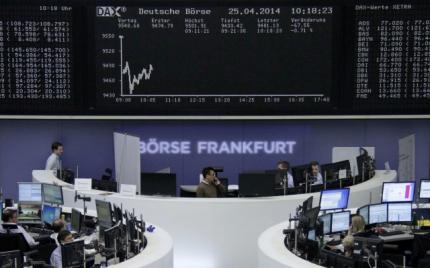European shares pegged back by Portuguese worries
Bareksa • 19 May 2014

The curve of the German share price index DAX board at the Frankfurt stock exchange (REUTERS/Remote/Stringer)
FTSEurofirst 300 up 0.2 pct, steadying after Thursday drop
Bareksa.com - Portugal's stock market fell for a fourth straight session on Friday on concerns over the country's economy, preventing broader European equity indexes from making much progress.
The pan-European FTSEurofirst 300 index edged up 0.2 percent to 1,360.05 points in late session trading, steadying after a 0.8 percent fall in the previous session that had knocked the index down off 6-year highs.
The euro zone's Euro STOXX 50 index also rose 0.2 percent to 3,168.80 points but Lisbon's benchmark PSI-20 index fell 0.6 percent, following on from declines earlier in the week including a 2.7 percent drop on Thursday.
Traders said the Lisbon market was hit by a 6 percent drop in Portuguese bank Banco Espirito Santo after it announced a discounted share issue to raise capital.
They added that ongoing concerns over the state of Portugal's economy, after data on Thursday showed a shock 0.7 percent drop in gross domestic product, was further weighing on the market, while Portuguese bonds also fell on Friday.
"We think there is always another euro zone crisis just around the corner," HED Capital head Richard Edwards said.
TIME TO GO DEFENSIVE?
Other traders were more confident that the broader, upwards trajectory of European stock markets remained intact.
The FTSEurofirst 300 remains up by nearly 3 percent since the start of 2014, in spite of Thursday's pullback which was triggered by data that showed a surprise contraction in the economies of Portugal and Italy.
Merger activity has also supported European stock markets this year, and French telecoms shares such as Iliad and those of conglomerate Bouygues - which owns Bouygues Telecom - rose on Friday on new signs of takeover activity in the sector.
Andreas Clenow, hedge fund trader and principal at ACIES Asset Management, was unconcerned by Thursday's stock market sell-off and was sticking with "long" positions betting on more gradual gains for European equities.
"So far, I don't see enough damage to the uptrend," Clenow said.
However, Sunrise Brokers equity strategist Christopher Mellor backed a more defensive approach to the equity markets and favoured utility stocks - often preferred for their solid dividend yields - to protect returns in case of any more prolonged stock market declines.
"We are advocating a more defensive bias," he said. (Source : Reuters)